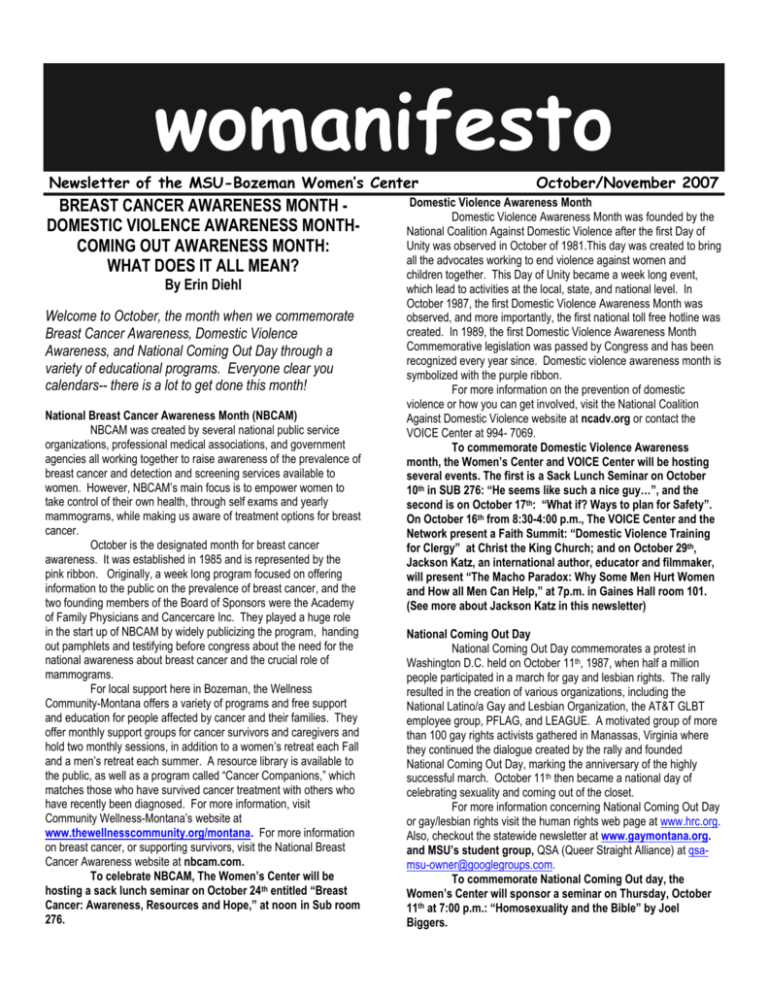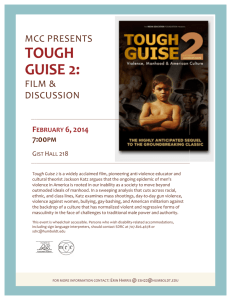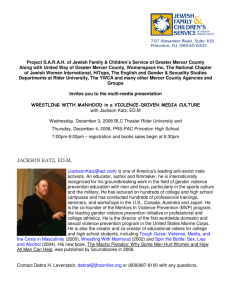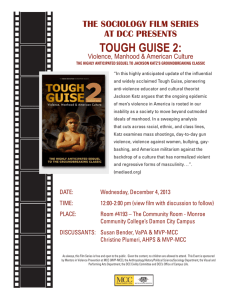
womanifesto
Newsletter of the MSU-Bozeman Women’s Center
BREAST CANCER AWARENESS MONTH DOMESTIC VIOLENCE AWARENESS MONTHCOMING OUT AWARENESS MONTH:
WHAT DOES IT ALL MEAN?
By Erin Diehl
Welcome to October, the month when we commemorate
Breast Cancer Awareness, Domestic Violence
Awareness, and National Coming Out Day through a
variety of educational programs. Everyone clear you
calendars-- there is a lot to get done this month!
National Breast Cancer Awareness Month (NBCAM)
NBCAM was created by several national public service
organizations, professional medical associations, and government
agencies all working together to raise awareness of the prevalence of
breast cancer and detection and screening services available to
women. However, NBCAM’s main focus is to empower women to
take control of their own health, through self exams and yearly
mammograms, while making us aware of treatment options for breast
cancer.
October is the designated month for breast cancer
awareness. It was established in 1985 and is represented by the
pink ribbon. Originally, a week long program focused on offering
information to the public on the prevalence of breast cancer, and the
two founding members of the Board of Sponsors were the Academy
of Family Physicians and Cancercare Inc. They played a huge role
in the start up of NBCAM by widely publicizing the program, handing
out pamphlets and testifying before congress about the need for the
national awareness about breast cancer and the crucial role of
mammograms.
For local support here in Bozeman, the Wellness
Community-Montana offers a variety of programs and free support
and education for people affected by cancer and their families. They
offer monthly support groups for cancer survivors and caregivers and
hold two monthly sessions, in addition to a women’s retreat each Fall
and a men’s retreat each summer. A resource library is available to
the public, as well as a program called “Cancer Companions,” which
matches those who have survived cancer treatment with others who
have recently been diagnosed. For more information, visit
Community Wellness-Montana’s website at
www.thewellnesscommunity.org/montana. For more information
on breast cancer, or supporting survivors, visit the National Breast
Cancer Awareness website at nbcam.com.
To celebrate NBCAM, The Women’s Center will be
hosting a sack lunch seminar on October 24th entitled “Breast
Cancer: Awareness, Resources and Hope,” at noon in Sub room
276.
October/November 2007
Domestic Violence Awareness Month
Domestic Violence Awareness Month was founded by the
National Coalition Against Domestic Violence after the first Day of
Unity was observed in October of 1981.This day was created to bring
all the advocates working to end violence against women and
children together. This Day of Unity became a week long event,
which lead to activities at the local, state, and national level. In
October 1987, the first Domestic Violence Awareness Month was
observed, and more importantly, the first national toll free hotline was
created. In 1989, the first Domestic Violence Awareness Month
Commemorative legislation was passed by Congress and has been
recognized every year since. Domestic violence awareness month is
symbolized with the purple ribbon.
For more information on the prevention of domestic
violence or how you can get involved, visit the National Coalition
Against Domestic Violence website at ncadv.org or contact the
VOICE Center at 994- 7069.
To commemorate Domestic Violence Awareness
month, the Women’s Center and VOICE Center will be hosting
several events. The first is a Sack Lunch Seminar on October
10th in SUB 276: “He seems like such a nice guy…”, and the
second is on October 17th: “What if? Ways to plan for Safety”.
On October 16th from 8:30-4:00 p.m., The VOICE Center and the
Network present a Faith Summit: “Domestic Violence Training
for Clergy” at Christ the King Church; and on October 29th,
Jackson Katz, an international author, educator and filmmaker,
will present “The Macho Paradox: Why Some Men Hurt Women
and How all Men Can Help,” at 7p.m. in Gaines Hall room 101.
(See more about Jackson Katz in this newsletter)
National Coming Out Day
National Coming Out Day commemorates a protest in
Washington D.C. held on October 11th, 1987, when half a million
people participated in a march for gay and lesbian rights. The rally
resulted in the creation of various organizations, including the
National Latino/a Gay and Lesbian Organization, the AT&T GLBT
employee group, PFLAG, and LEAGUE. A motivated group of more
than 100 gay rights activists gathered in Manassas, Virginia where
they continued the dialogue created by the rally and founded
National Coming Out Day, marking the anniversary of the highly
successful march. October 11th then became a national day of
celebrating sexuality and coming out of the closet.
For more information concerning National Coming Out Day
or gay/lesbian rights visit the human rights web page at www.hrc.org.
Also, checkout the statewide newsletter at www.gaymontana.org.
and MSU’s student group, QSA (Queer Straight Alliance) at qsamsu-owner@googlegroups.com.
To commemorate National Coming Out day, the
Women’s Center will sponsor a seminar on Thursday, October
11th at 7:00 p.m.: “Homosexuality and the Bible” by Joel
Biggers.
Purple Haze: Breaking Down Stereotypes in the Case of Same Sex Abuse
By: Julia Zema
The color purple signifies both Domestic Violence
Awareness Month and National Coming Out Day—the
purple ribbons helping us remember those struggling
behind closed doors and in personal closets. One goal
during this year’s National Domestic Violence
Awareness Month is to break down stereotypes-especially those identifying domestic violence
exclusively as a heterosexual issue. Lack of knowledge
about violence within homosexual relationships further
oppresses those victims. Few people realize the severity
of abuse though it occurs with the same frequency as
within heterosexual relationships. Gender is a
significant component and the assertion of gender roles
is often the root of domestic violence. Victims who
experience abuse within GLBT relationships may face
similar reactions and obstacles when seeking help, but
their GLBT status often leads to many additional
challenges when attempting to find support.
Our patriarchal and homophobic society defines and
judges those who differ from the “norm.” Gay and
lesbian couples are often defined by their sexuality and
their “otherness” -- a fact which often leads to a myriad
of challenges that can work to make their lives much
more difficult. Abuse within a GLBT relationship can
present even more unique problems, as many laws used
to protect victims are specific heterosexuals. An abuser
in a GLBT relationship may have an added layer of
coercion and power by threatening to “out” their
partner to family, friends, or co-workers, and may be
aware of the fact that the victim is less likely to look for
support because of their closeted status. Assumptions
about partners (i.e. that all intimate relationships are
between men and women) in the law and justice system
continue to make seeking out help and support more
difficult by potentially alienating victims. The same
prejudice against women that exists in a patriarchal
culture works to alienate gays and lesbians in a
homophobic culture. When lesbians suffer abuse in a
domestic relationship, they struggle with both of these
issues, making their situation more overwhelming.
In heterosexual relationships, where men are more
often the abusers, violent acts are carried out in line
with society’s belief of male dominance. Abusers within
GLBT relationships may assert a male-oriented gender
role which can lead to violence. The isolation which is a
result of living in a heterosexist and homophobic
culture may influence partners within GLBT
relationships to form a stronger sense of dependency
towards one another. "This increased dependency and
isolation may result in an increased need to control
one's partner, especially in relationships where one
lesbian passes as heterosexual while her partner does
not, or when one partner seeks more independence or
separation." (Psychologist Lori Haskell)
Multiple myths regarding domestic violence in same
sex relationships still exist, and it is important to
understand and debunk these are myths in order to
increase awareness. People may define abuse as fighting
in GLBT relationships because the two partners are
viewed as equals in society. Understanding that
domestic violence or abuse is the use of control by one
person over another, regardless of their perspective
genders, is crucial in recognizing this dynamic as abuse.
One existing stereotype is that women are not capable
of physical violence, and therefore, domestic abuse
cannot exist within lesbian relationships. Though these
views are slowly changing and we are seeing progress
within the judicial and law enforcement fields,
traditionally, in situations where both the victim and
batterer are women, police have a difficult time
identifying their suspect and victim when called to a
crime scene. Homophobic beliefs influence many law
officials and juries to take domestic violence in lesbian
relationships less seriously.
Lesbian and gay victims often have different
experiences in coping with domestic violence and
finding support systems and resources is often much
more difficult than it may be for their heterosexual
counterparts. When both the abuser and victim are
women, each has access to resources including shelters,
making this an unviable and unsafe option for the
victim. Oppression of both women and GLBT
populations can prove to be even more dangerous when
applied to those in abusive relationships. We need to
spend our energy debunking myths about gender roles
and GLBT people and keep educating social workers,
domestic violence shelter workers, police officers, and
those in the judicial system about the unique challenges
faced by gay and lesbian victims of abuse.
More resources are currently available to help gay and
lesbian victims of domestic violence. Services have been
established specifically for GLBT victims, and many
advocates and shelter coordinators receive special
training to raise their awareness of the unique nature of
same sex domestic violence. The Northwest Network
for GLBT Survivors of Domestic Violence
(www.nwnetwork.org) specifically caterers to nonheterosexual domestic violence. In addition, the VOICE
Center (406-994-7069) or The Women's Center (406)
994-3836), both on Montana State University's campus
can provide resources to help victims and survivors of
domestic violence.
The Women's Center is Open for You
The MSU Women’s Center is celebrating its 24th year as an office on campus.
This is your Women's Center. We are here to serve all students, faculty, staff
and community members. In the Women's Center you will find a welcoming
space with room to study and explore. We house a special treasure: the
Geraldine Fenn Memorial Library. This cozy little lending library houses over
1900 books primarily by or about women and a wall of fantastic newsletters and
magazines. Anyone can check out books for free. Donations of books and
magazine subscriptions appropriate to our library are always welcomed. Come
and check it out.
When you find our office at 15 Hamilton Hall, our staff will greet you and
gladly help you find answers to your questions, tell you about our programs and
services, steer you to groups or other organizations that may be helpful, show
you a big book full of scholarships for women, invite you to volunteer, or try to
meet any other need you might present.
But you don't have to wait that long to enjoy your Women's Center, we
are open Monday - Friday, 9 a.m. - 4 p.m.
Local Women's Resources:
The Network Against Sexual and Domestic Abuse (24-hour Shelter & Crisis
Line), 586-4111
Bridger Clinic, Inc. (Reproductive Health Care), 587-0681
Career Transitions, Inc. 388-6701, careertransitions.com
Child Care Connections, 587-7786
HELP Center (24-hour crisis line), 586-3333
MSU Police (24-hour emergency), 994-2121
MSU Counseling and Psychological Services, 994-4531
MSU Student Health Services, 994-2311
MSU VOICE Center (Victim Options In the Campus Environment), 994-7069
(24-hour crisis line)
MSU Women's Center, www.montana.edu/~wwwwomen, 994-3836
Montana Women Vote! Project, (406)543-3550 (Missoula),
montanawomenvote.org
Parents, Family & Friends of Lesbians & Gays (PFLAG), 723-7251 (Butte),
252-5440 (Billings)
PRIDE, www.gaymontana.com/pride, 1-800-610-9322
QSA (Formerly Q-MSU): Lesbian, Gay, Bi-sexual, Transgender,
Questioning, and Allies Student Organization, 994-4551, or qsamsu@googlegroups.com
Women's Voices for the Earth, 585-5549
QSA (Queer Straight Alliance) Update
QSA is a campus based student organization for lesbian, gay, bisexual, questioning, and
transgender students, staff and community members, and allies in Bozeman. Weekly forum
meetings are held at 7:00 p.m. on Monday evenings, and a variety of bi-weekly social programs
are also held throughout the academic year. Forum meeting provide an opportunity to discuss
topical issues pertaining to the perception of sexual identity in the Gallatin Valley, meet others,
and become the catalyst for social change in Bozeman. Social programs like coffee and bowling
nights offer those interested the opportunity to meet with others that are similarly minded, and
help to form a strong LGBTQ-allied community in Bozeman.
The personal is often political, so stay apprised of the current political climate and events
and the action alerts which can be sent to you from qsa-msu@googlegroups.com--just write
and let them know you’d like to be included on their email list for updates. Make sure you stay
politically active if these issues are important to you, your friends, family or other people you
care about. Letters, calls and emails to your representatives DO make a difference!
All LGBTQ students and community members are welcome at our confidential meetings as well as
parents, friends and allies. To find out where meetings are or to get more information about
coffee nights, bowling events, and pizza nights, or about QSA in general, contact us at 994-4551,
e-mail us at qsa-msu@googlegroups.com, or visit our website at www.qsamsu.com.
Check around for posters about upcoming events to celebrate National Coming
Out day on October 11th, and be sure to check out the dance on October 13th!
Fall 2007 Sack Lunch Seminars!
October 17: What if? -- Ways to Plan for Safety
SUB 276
Statistically, 1 in 4 women in the United States will experience domestic violence in their lifetime.
Join Shannon Root, Community Education Advocate from the Network Against Domestic and
Sexual Abuse, to explore the ways in which you or a friend can plan financially for safety.
October 24: Breast Cancer Awareness Month
SUB 276
October is Breast Cancer Awareness Month. Join us for this discussion of how two local groups,
The Center for Cancer Support and Team LUNA Chix, are working together to raise awareness for
the prevention and treatment of breast cancer, a disease that now affects one in eight women.
October 31: Witch's Brew: A Brief History of Plant Medicine
SUB 276
Witchcraft medicine is one of the oldest healing arts on earth. This lecture, offered by Kris Hill,
founder of Hill Botanical, will look at the myth of the scary mean old witch and the plants she liked
to use. How did those brooms fly anyway?
November 7: Adoption Birthmothers: Who Are You?
SUB 276
Join Alaina Lammer Knight, an adoption caseworker for the Lutheran Social Services of Montana,
for this interesting and eye-opening discussion of who birth mothers really are. Alaina will take this
opportunity to bust some of the myths surrounding birth mothers and to give us a clearer picture of
the adoption process as a whole.
November 28th Gender Bias in Science
SUB 275
Join Assistant Professor Kristen Intemann for this discussion of the different ways in which gender
stereotypes and assumptions have influenced what scientists have studied and observed, how
research questions are framed, and how data is interpreted.
DO NOT MISS THIS ONE!
JACKSON KATZ IS COMING TO BOZEMAN!
Jackson Katz, educator, author, and
filmmaker, who has long been recognized as
one of America’s leading anti-sexist male
activists, is coming to Bozeman at 7:00 p.m. on
Monday, October 29th. Katz’s groundbreaking
new book, The Macho Paradox: Why Some
Men Hurt Women and How All Men Can Help,
explores the ways in which male dominant
culture contributes to sexual and domestic
violence. Katz strongly believes and advocates
for the idea that all men, even those who do
not commit violent acts against women, can
help stop this violence. He readily suggests
strategies to enlist men in the fight against all
forms of violence against women.
Katz is a former all-star football player
who became the first man at the University of
Massachusetts Amherst to earn a minor in
Women’s Studies. He holds a masters degree
from the Harvard Graduate School of
education and is currently pursuing a doctoral
degree in cultural studies. In 1988, Katz became
the chief organizer for Real Men, the Boston
based anti-sexist men’s organization. Believing
that only men can effectively stop violence
against women, Katz’s work focuses on
educating and motivating men by raising
awareness, particularly in the sports culture and
military.
Katz co-founded MVP, Mentors in
Violence Prevention, a program at
Northeastern University. MVP is currently the
most widely utilized sexual and domestic
violence prevention program in professional
and college athletics. He was a member of the
U.S. Secretary of Defense’s Task Force on
Domestic Violence in the military from 20002003, and since 1990, has lectured at more than
950 colleges, prep schools, high schools,
professional conferences and military
instillations. For more information about this
and other events for National Domestic
Violence Awareness Month, call the VOICE
Center @ 994-7069.
MONDAY, OCTOBER 29TH @ 7:00 IN GAINES HALL, ROOM 101










